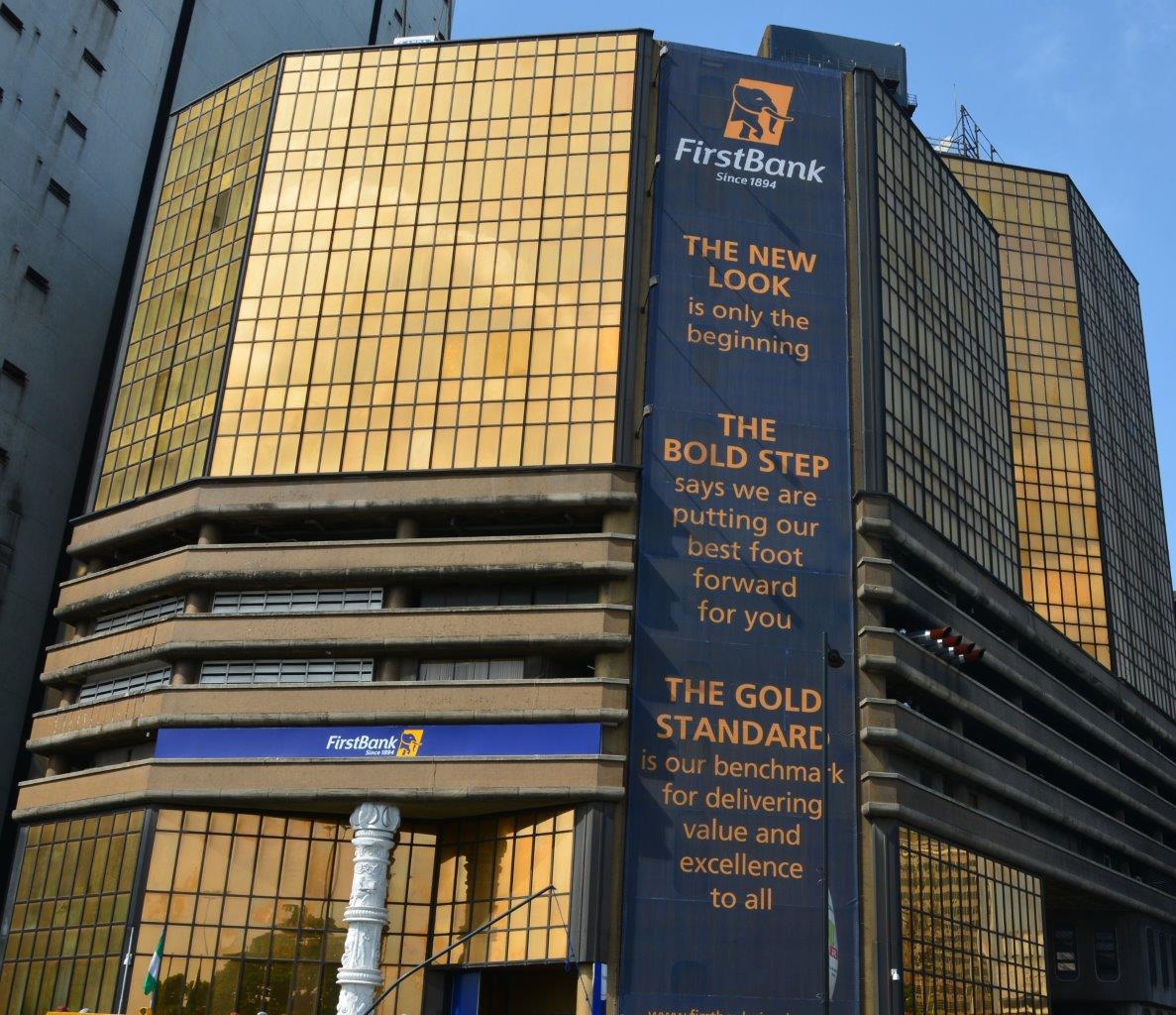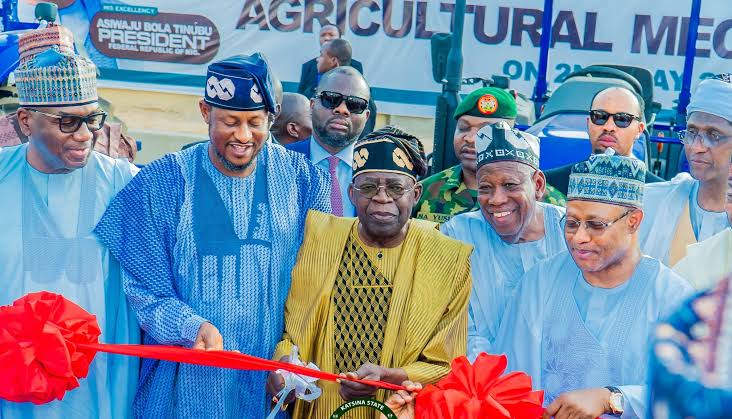Feature/OPED
First Bank’s New TVC: Of Historical Renaissance and Innovative Validation

By Raheem Akingbolu
In its new Television Commercial, First Bank tells a story that reflects the beginning of modern banking and how the bank has consistently grown with Nigeria’s enterprises through partnership and innovation.
When the promoters said First Bank was “truly the first,” many grudgingly agreed. But deep inside its competitors – the possible grudging camp – is the truth regarding the extreme distance the bank has given others in performance and people relevance of its operations!
They knew the bank was not bluffing. Not only has it rediscovered itself, but the ability to shed its ancient mindset in terms of operations and blend with modern trends in banking have left many agreeing that perhaps, the saying that the older the wine the better it gets in taste actually applies to First Bank.
Its new television commercial (TVC) says it all: a combination of historical renaissance and quite prescient validation of the innovation that usually drives its bewitching communicational ads.
From the groundnut pyramids of the north, which was the symbol of the regions commercial edge and the cocoa bean mountains of Western Nigeria to the rubber plantations of the East and Mid-eastern region, First Bank has applied its new campaign to remind its decades-old patrons, customers, and even competitors, that the beat has refused to abate.
Throughout the campaign, First Bank subtly registers itself in the minds of the banking public that it’s entirely Nigerian – past, present, and the future.
The well-crafted historical simulation captures how First Bank opened its first branch in Lagos in 1894 and started helping merchandise and local traders to grow their businesses.
The excitement and enthusiasm on the faces of the bank’s early customers after getting their cash books from the Lagos office say it all. Like someone who has gotten a glimpse of what the future holds with banking, the customers express surprises and happiness. The commercial captures the mood and goes back in memory lane on how the bank has helped many people succeed in their ventures.
Subtly, the narrator takes viewers to Kano and reveals how the then richest men in the commercial city were making their deposit of 20 bags of Silver in an atmosphere that looks like the first operational day of the bank.
Perhaps the beauty of the commercial lies more in the way it strikes a balance between the ancient and the modern days through setting and swapping of background colours. This was cleverly explored by those who conceptualised the TVC, especially in referencing the way the bank transformed into an online haven, driven by technology.
While reminding the patrons of the bank’s transformation and technological advancement, the narrator is quick to talk about the expansion of the bank beyond the shores of Nigeria to the West-African region and beyond.
The TVC also positions FirstBank as a socially responsible brand by touching on various initiatives it has embarked on. Specifically, First Bank’s contribution to sports through its support for football and athletics is captured very well.
For all these achievements, the narrator narrows the story to the bank’s ability to produce two governors of the nation’s apex bank –the Central Bank of Nigeria (CBN), apparently referring to Dr Joseph Oladele Sanusi and Mallam Sanusi Lamido Sanusi.
It will be recalled that Dr Sanusi was appointed by the federal government as the Governor of CBN in May 1999 by President Olusegun Obasanjo, serving until May 2004. Sanusi was picked as a safe and conservative banker. He resumed the same day the former President Obasanjo was sworn in on May 29, 1999. He assembled his team of “eggheads” as Deputy Governors, a perfect mix of public and private sector experts. The central bank made remarkable progress under his leadership.
Then on June 1, 2009, the second First Bank product, Lamido Sanusi was nominated as Governor of the CBN by late President Umaru Musa Yar’Adua; his appointment was confirmed by the Nigerian Senate on June 3, 2009, during the global financial crisis. It is on record that against all odds, the new helmsman superintended the transition and consolidation in the then wobbling and ailing banking sector into a virile and solid financial transactions sector.
Sanusi remained in office and continued his wonders until former President Goodluck Jonathan took over. In this position, Sanusi won the prestigious international award of “Central Banker of the Year.”
Succinctly speaking, the TVC captures the 126 years history of First Bank. It also shows that the bank’s long years of existence notwithstanding, its handlers haven’t allowed complacency to dampen the drive to position the nation’s number one financial institution as the best and one of the best brands that are making Africa proud. For 126 years, First Bank has navigated Nigeria’s banking landscape, supporting businesses and building other brands.
But the First Bank story is that of not giving up despite all odds. However, the greater story hasn’t been told by those who daily promote it, but the hope of financial security it has consistently given to the ultimate owners of the brand – the banking public – continues to resonate.
This explains why, in a country where the mortality rate is high in the market, the brand still remains a reference point, when it comes to building an enduring African brand in all the years of its existence.
Last year, the bank commemorated its 125th anniversary and the event created a unique opportunity for it to distinguish itself quite clearly from other banks and organisations in Nigeria, Africa, and the world.
Through the anniversary celebrations, the team was able to reiterate that First Bank has been part of Nigerians, enabling them financially and securing their businesses through needful supports and advisories, ultimately achieving their customer-centric goals. First Bank has today become a pivotal integral of Nigerians as individuals and Nigeria’s corporate history.
According to them, this sets the brand clearly apart in a space of its own, as a bank that is beyond comparison – one which has woven into the fabric of the society for many years and has continued to be relevant, relentlessly and unrelentingly.
Feature/OPED
Navigating the Maze: Solutions for Nigeria’s Flourishing Foodtech Industry

By Diana Tenebe
Nigeria’s foodtech sector holds immense promise to transform our nation’s food production, distribution, and consumption systems. However, this burgeoning industry currently navigates a complex maze of challenges that could significantly hinder its progress.
While innovation and entrepreneurial drive are abundant, a confluence of infrastructural deficits, economic headwinds, technological disparities, and logistical complexities casts a shadow on the sector’s long-term viability.
Understanding and addressing these multifaceted hurdles is paramount for foodtech companies aspiring to thrive and contribute meaningfully to Nigeria’s food security.
One of the most significant impediments to the foodtech sector’s advancement is Nigeria’s persistent infrastructural weaknesses. The unreliable power supply, a well-known constraint for businesses nationwide, directly threatens food preservation, increasing spoilage risks and driving up operational costs for companies reliant on refrigeration and consistent processing.
Similarly, the often-deteriorated state of our road networks complicates logistics and transportation, hindering the efficient movement of goods from farms to consumers and across the supply chain.
Furthermore, limited access to clean water exacerbates operational challenges, particularly for maintaining food processing and hygiene standards. Collectively, these infrastructural shortcomings inflate operational expenses and introduce vulnerabilities throughout the food supply chain.
Economic constraints add another layer of intricacy. Fluctuations in currency exchange rates create instability in pricing and procurement, especially for businesses dealing with imported technologies or ingredients. Persistent inflation erodes consumer purchasing power and increases the cost of essential inputs, squeezing profit margins for startups.
Moreover, limited access to credit and investment capital makes it difficult for emerging foodtech companies to secure the necessary funding to invest in crucial technology, infrastructure, and expansion efforts. This financial constraint can stifle innovation and prevent promising ventures from reaching their full potential.
The digital divide also poses a unique challenge for foodtech companies aiming to leverage online platforms and digital solutions. While mobile phone usage is widespread in Nigeria, disparities in digital literacy and access to reliable internet connectivity can restrict the widespread adoption of online food ordering and delivery services, particularly in rural and underserved communities. This necessitates creative and inclusive strategies to bridge the digital gap and reach a broader consumer base.
Inefficiencies within the supply chain represent a critical bottleneck in the Nigerian food system. Fragmented agricultural supply chains, characterised by numerous intermediaries and a lack of transparency, contribute to alarmingly high post-harvest losses.
Inadequate storage facilities and inefficient transportation infrastructure further compound these issues, leading to significant waste and price volatility. Addressing these systemic weaknesses is crucial for ensuring a stable and affordable food supply for all Nigerians.
Navigating Nigeria’s regulatory landscape can also be a daunting task for foodtech businesses. The presence of multiple regulatory agencies, coupled with often bureaucratic and time-consuming processes for obtaining licenses and permits, can create significant hurdles for startups. Clear, consistent, and streamlined processes within the regulatory framework are essential to foster a more enabling environment for innovation and growth.
Building consumer trust and acceptance for new food technologies requires overcoming inherent skepticism and unfamiliarity. Concerns regarding food safety, quality, and the security of online transactions can hinder the adoption of novel food products and digital platforms. Transparent communication, robust quality control measures, and consistent consumer engagement are vital for building confidence and fostering widespread acceptance.
Finally, a notable talent gap exists within the Nigerian foodtech ecosystem. A shortage of professionals possessing specialised skills in food science, technology, business management, and logistics can limit the growth and innovation capacity of companies in this sector. Addressing this skills deficit through targeted training and development initiatives is crucial for long-term success.
Despite these significant challenges, promising pathways forward can be forged through innovative and context-specific approaches. Investing in localised infrastructure solutions, such as independent power generation and efficient localised logistics networks, can mitigate the impact of broader infrastructural deficiencies.
Exploring diverse funding avenues beyond traditional banking, including angel investors, government grants, crowdfunding, and revenue-based financing, can alleviate financial constraints.
Adapting to the digital divide by leveraging basic mobile technology and employing offline strategies like local agent networks can expand reach and inclusivity. Building resilient supply chains through direct farmer relationships, investing in aggregation centres, and utilising technology for farm management offer tangible solutions to logistical inefficiencies.
Proactive engagement with regulatory bodies and advocating for clearer, more supportive policies are crucial for navigating the regulatory landscape effectively. Building consumer trust necessitates transparent sourcing practices, clear communication about product benefits and safety, and active engagement with consumer feedback.
Finally, investing in talent development through collaborations with educational institutions and in-house training programs can bridge the critical skills gap.
Foodstuff Store is emerging as a business with a clear vision to directly confront several of these challenges. We are actively developing a decentralised network of businesses supported by strategically located distribution hubs across target states. This approach will directly address the limitations imposed by poor road networks, ensuring more localised access to our food products.
Furthermore, the establishment of regional storage facilities, including a state-of-the-art solar-powered cold storage, directly tackles infrastructural deficiencies related to food preservation and ensuring a consistent supply.
Foodstuff Store’s ambition for end-to-end management of the food supply chain, encompassing in-house production, direct sourcing, advanced storage solutions, and efficient distribution, offers a powerful solution to existing supply chain inefficiencies.
This integrated approach promises enhanced quality control, significant reductions in post-harvest losses, and a more reliable supply of both perishable and non-perishable goods for our customers.
Our aspiration to become the “Amazon for Food Products” is a clear and ambitious goal underpinned by a technology-driven approach to all aspects of our operational management. Foodstuff Store’s vision underscores a business model strategically designed to overcome significant hurdles within the Nigerian foodtech sector, offering a beacon of potential and a pathway to a more secure and efficient food system in a challenging yet remarkably promising landscape.
By Diana Tenebe is the Chief Operating Officer of Foodstuff Store
Feature/OPED
President’s Katsina State Visit Exposes Disconnect from People’s Needs

By Abba Dukawa
The recent visit by the President Bola Tinubu to Katsina State has sparked concerns about the disconnect between the government’s priorities and the people’s needs. The visit exposed the hypocritical approach to the need of their people, states and the northern Nigeria as whole. The quality of leadership in the region has been questioned, with allegations of self serving interest, ineptitude, and a lack of vision.
This is in spite of the fact that northern Nigeria as a whole faces numerous challenges that threaten its stability and development. Some of the key issues include insecurity, poverty, education, economic hardship, inequality and social and cultural challenges. The visit has been seen as an opportunity missed to engage with the state’s residents, listen to their concerns, and chart a way forward for development.
While the visit was marked by displays of pageantry and entertainment, the state’s pressing issues such as insecurity, poverty, and economic hardship, seemed to take a backseat. Critics argue that the government’s focus on superficial events rather than addressing the root causes of the state’s challenges is a clear indication of a disconnect from the people’s needs.
The introduction of Rarara’s wife to the President by the Katsina State Governor, contravening cultural and religious norms, raise questions about leaders’ priorities and values.
Current leaders in the north seem more focused on personal interests and political survival than advocating for the northern Nigeria improvement.
Regardless of the challenges in the region the Governors keep praise for the President’s economic reforms, notwithstanding the region’s struggles, is concerning. economic reforms should lift people out of poverty, create jobs, and stimulate growth. If not yielding tangible benefits, they need reevaluation.
The north needs leaders prioritizing regional development and working towards a brighter future. Leaders understanding our region’s problems and committed to tackling them head-on are crucial. It’s time for a shift in approach, prioritizing people’s needs over personal interests.
As we move forward, we must demand more from our leaders. We need leaders who will stand up for the north and work tirelessly to find solutions. Anything less is a disservice to the region and its people.
We need leaders who cultivate a culture of good governance, prioritizing accountability and transparency to address insecurity and promote development.
The north needs a visionary leaders who prioritize all citizens’ needs, regardless of tribe or religion, are crucial for unity and stability.
Leaders who accelerate economic development, create jobs, and provide essential services like education and healthcare can reduce poverty and insecurity.
We require leaders who will combat corruption and promote social justice, reducing inequality and fostering stability.
In northern Nigeria, effective security reforms are necessary, including modernizing security agencies, enhancing intelligence gathering, and addressing insecurity’s root causes to ensure public safety.
To bridge the gap between the government and the people, there is a need for leaders who understand the intricacies of the state’s problems and are committed to tackling them head-on. By prioritizing the people’s needs and working towards sustainable development, the government can build trust and foster a sense of ownership among its citizens
May God guide Nigeria towards true development and prosperity.
Dukawa, a concerned Nigerian, can be reached at abbahydukawa@gmail.com
Feature/OPED
Changing University Climate: It’s No Longer “Publish or Perish,” It’s “Be Visible or Vanish”

By Timi Olubiyi, PhD
For decades, the expression “publish or perish” has been of interest to academics, researchers, and professionals worldwide. Success is measured by the total number of peer-reviewed articles published, conference proceedings available online, and book chapters produced and published.
Despite so much research stemming from academic institutions, not many of these publications enjoy wide visibility in particularly those published in non-indexed journals.
Academics are continuously encouraged to increase the impact of their research endeavours, but what really constitutes impact in today’s academic environment? Is it the number of citations for your published research? Is it the amount of research funds your name and profile can generate? Is it the number of speeches and presentations you deliver about your research area? Is it the number of boards/committees/working groups that you serve on? And so on.
Though in the academic world, publication signifies validation and survival in most universities for promotion and relevance; in fact, it remains a cornerstone of career advancement. From early-career lecturers to senior professors, scholarly publishing plays a pivotal role in demonstrating expertise, building reputation, and meeting institutional benchmarks for promotion.
However, in today’s hyper-connected, information-saturated environment, a compelling principle has emerged: “Visible or vanish.” In other words, it is not just what you publish; it is who sees it, talks about it, and shares it that matters. Today, there is a stronger emphasis on quality, impact, relevance, and where your articles are published.
Globally, publications in high-impact journals measured and indexed in Scopus, Web of Science, Australian Business Deans Council (ABDC), Chartered Association of Business Schools (ABS), Science Citation Index Expanded (SCIE), Social Sciences Citation Index (SSCI), Directory of Open Access Journals (DOAJ), and more are given serious emphasis.
The primary reason for academic publication should be to advance knowledge, not merely for promotion or institutional expectations. In the author’s opinion, the true reasons for academic publication are to help scholars establish their intellectual identity, which represents a personal academic brand, provide a platform for international recognition, and create career milestones.
Though the gatekeeping role in academia has diminished, this has created a market for predatory journals for academics aiming for promotion. What are predatory journals? They are journals that are fraudulent or unethical academic journals that pretend to be legitimate scholarly publications but do not follow proper peer-review standards, editorial practices, or have recognized indexation.
All they need is money, money and money, no values or integrity. Predatory journals prioritize profit over quality and can seriously harm the academic career of a scholar with a global vision.
Though academic publications still remain respected, considering indexation is key even for institution-based journals (Journals run by university departments). Publication remains the foundation of academic promotion, but how and where academics publish matters more than ever.In an academic environment that is increasingly competitive, interdisciplinary, and global, researchers must not only produce excellent work but also strategically position it for maximum visibility and influence.
Both academics and researchers must consider more than just publication because we have only two key roles in publishing- to do our research and to communicate the research; the latter is the focus of this piece. Our research needs to be noticed, cited, and discussed due to its impact, or we risk being completely overlooked.
Platforms like Google Scholar, ResearchGate, LinkedIn, Facebook groups, Twitter (now X), and even TikTok have become unexpected grounds for attention. Researchers who communicate their work beyond academic circles through public lectures and engaging online posts amplify their impact dramatically.
A highly cited, visible paper can transform careers far faster than a series of obscure journal articles ever could. Therefore, for relevance and global standards, a quality publication with visibility is required.
Visibility today means publication with recognition, a visibility that can connect researchers to a broader global academic community. It can also enhance career and funding opportunities beyond the immediate environment of the researcher.
When publication is executed correctly, it has the potential to create change beyond academic circles, influence policies, and shape professional practices. It can also raise public awareness on critical issues like climate change and inequality.
With millions of articles published annually, even excellent research can be buried unless actively promoted to make it widely visible. Good visibility can also improve invitations for collaborations, keynote addresses, consulting engagements, and even career pivots beyond academia. Visibility, thoughtfully pursued, is no longer optional; it is extremely important. It may also help fulfil deeply personal motivations.
However, remember that scholarly publishing is not a one-way communication. It should encourage and invite critique, discussion, and debate; that is what visibility can provide. Research that enjoysvisibility has a higher chance of influencing policy, industry practices, and public understanding
It is safe to say it is key for researchers, scholars and academics to navigate this new landscape.Visibility is increasingly vital in academia as it directly influences career progression, research significance, and the capacity to engage with a broader audience. Enhanced visibility can connect to opportunities for international research partnerships, funding, and new audiences globally.
In the current competitive academic environment, merely publishing research is insufficient; scholars must proactively advocate for their work and establish a robust online presence to guarantee visibility and media attention. In an era of increasing pressure to publish quickly and frequently, remembering these true reasons can help academics stay focused on purpose over performance, ensuring that their contributions are not only counted but truly matter.
Therefore, publish wisely, publish well, and publish with purpose, along with incredible consistency. In the contemporary technological era, the way research information is handled, conveyed, processed, shared, and maintained has changed.Therefore, my colleagues, be a thought leader, there is a need to gravitate towards social media because it can improve visibility and also to promote research findings or knowledge thereof. So, welcome to the era of visible or vanish. Good luck!
How may you obtain advice or further information on the article?
Dr Timi Olubiyi is an expert in entrepreneurship and business management, holding a PhD in Business Administration from Babcock University, Nigeria. He is a prolific investment coach, author, columnist,seasoned scholar, Chartered Member of the Chartered Institute for Securities and Investment (CISI), and a registered capital market operator with the Securities and Exchange Commission (SEC). He can be reached on Twitter at @drtimiolubiyi and via email at drtimiolubiyi@gmail.com for any questions, reactions, and comments.
The opinions expressed in this article are those of the author, Dr. Timi Olubiyi, and do not necessarily reflect the views of others.
-

 Feature/OPED5 years ago
Feature/OPED5 years agoDavos was Different this year
-
Travel/Tourism9 years ago
Lagos Seals Western Lodge Hotel In Ikorodu
-

 Showbiz2 years ago
Showbiz2 years agoEstranged Lover Releases Videos of Empress Njamah Bathing
-

 Banking7 years ago
Banking7 years agoSort Codes of GTBank Branches in Nigeria
-

 Economy2 years ago
Economy2 years agoSubsidy Removal: CNG at N130 Per Litre Cheaper Than Petrol—IPMAN
-

 Banking2 years ago
Banking2 years agoFirst Bank Announces Planned Downtime
-

 Sports2 years ago
Sports2 years agoHighest Paid Nigerian Footballer – How Much Do Nigerian Footballers Earn
-

 Technology4 years ago
Technology4 years agoHow To Link Your MTN, Airtel, Glo, 9mobile Lines to NIN













